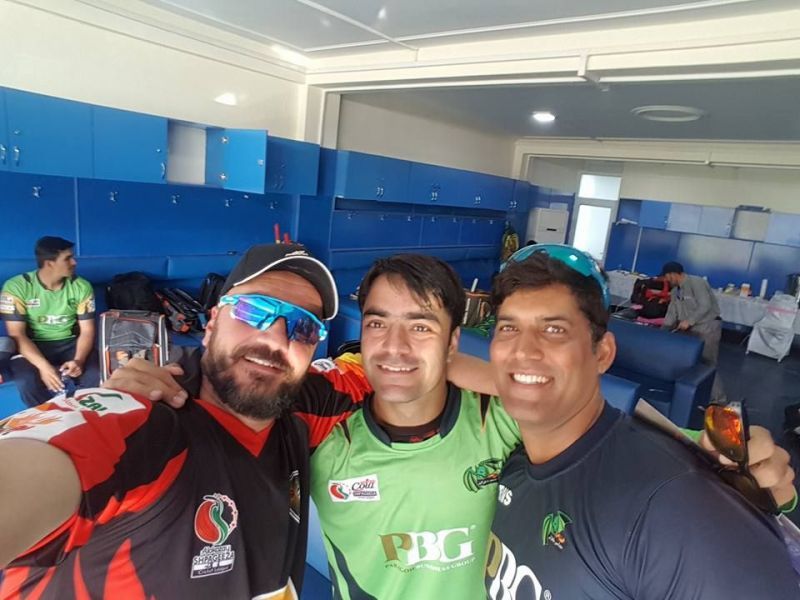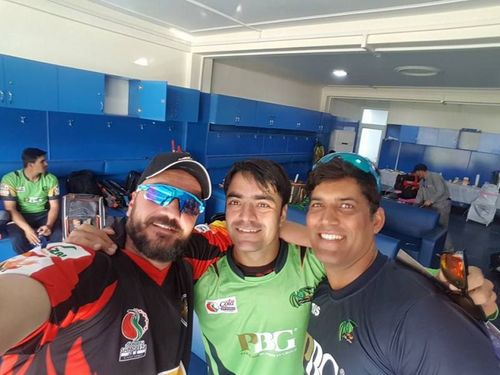
"Blast in Bombay doesn’t stop people from travelling in trains, it’s the same in Afghanistan," says Umesh Patwal

Umesh Patwal, who grew up playing cricket in Mumbai, has gone through several ups and downs with the Afghanistan Cricket team over the past few years as the batting coach.
And the dreams of Afghanistan cricket fraternity came true when they featured in their maiden Test match against India in Bengaluru this week.
Patwal, who was also involved in the Shpageeza Cricket League of the ACB as the coach of Band-e-Amir Dragons led by Rashid Khan, has not only witnessed the struggles of their cricketers in attaining Test status but has endured a few tough moments personally off the field as well in Afghanistan.
One such instance was a bomb blast that happened at the Kabul International Cricket Stadium in 2017. Yet, those sad and difficult moments were no deterrent for Patwal as he stuck to his task and guided the Afghan boys to where they are now.
In an exclusive chat with Sportskeeda prior to the Test match, Patwal opened up on numerous subjects and the way forward for Afghanistan in Test cricket.
Excerpts:
Afghanistan have finally made it to Test cricket…
Yes, it's been a long journey. But that's what the whole dream was when I joined them for the first time.
So, how has been the rise of Afghanistan cricket? You have seen it right from the dressing room.
It's the passion I think, the way they play the game; it's the passion that has taken them a long way. Plus, they're very keen learners, they are very good at doing what they want to do, and obviously the passion – not just the passion of playing, but the passion of winning the game is why they have taken such big strides – and also doing it much faster than other nations would have done.
What do you feel is the biggest change in Afghan Cricket ever since you took over in 2010? It has been seven to eight years of association with them for you…
I think I should compliment the Afghanistan Board, because they have got a very good structure for the under-19s at the domestic stage, and they have done a great job with making sure that the boys get a good remuneration where they could, you know, keep focussing on more cricket instead of worrying about a lot of other things.
You're from Mumbai and you know the Indian cricket system properly. In Afghanistan Cricket, there was a lot of other stuff happening – the political tensions that are always there. You were, in fact, a part of one such mishap. Can you take us through how difficult it is as an outsider to be a part of Afghanistan Cricket?
It's the same thing, because I've shared the same passion of the game - cricket, which is where, you know, we don't worry about small mishaps which can happen anywhere – even in Bombay – we had the Bombay blast, but that doesn't stop the Bombay guys from travelling in trains. So it's the same thing when you go to Afghanistan.
It's like a part of life, which has reduced now, but it's more about people enjoying the game, so it wasn't a big deal for me to go back and the kind of passion and love the people back in Afghanistan give you, it just helps you to go back, and it doesn't make me worry much about what happened.
You know that cricket is the most important sport that is being spoken about in India. In Afghanistan, how difficult is it for you to motivate the players when they start failing on the ground?
The best thing is, it's easier for us to motivate them, because that's the only thing they look at. Like in India, cricket is the biggest sport in Afghanistan, so whenever there is a failure, they always take it as a lesson, like a way of learning by falling down sometimes. They were very keen on learning the reason for the failure, because if you know the reason well, it's easier to overcome those things.
The likes of Rashid Khan and Mohammad Nabi – these guys have put Afghanistan Cricket on the World Map. How do you see junior cricket developing – because Rashid Khan at 19 is like a role model for the entire country.
It's not just Rashid Khan. If you look at the growing generation – there's Mujeeb, then there is Zahir, and there are other guys who have taken over, not just Rashid and Nabi.
Even if you look at Asghar Stanikzai, or the captain before him like (Navroz) Mangal and Karim and all these guys – all of them have been role models, not just for Afghanistan Cricket but also for lots of other associate nations, because they were so passionate about the game, and also for the country.
It has helped not just Afghanistan, but also other associate countries, because they find it easier to get associated with each other; they share similar problems – whether it is domestic cricket, and the kind of funding that comes to them. So I think it's a win-win situation not just for Afghanistan but for a lot of associate countries as well.
And Rashid Khan obviously is such a great player, and the kind of passion that he takes onto the ground, he has to be a role model not only for guys back in Afghanistan but also for young cricketers in India and other parts of the world.
Rashid Khan is a bowler; Mujeeb is a bowler; Mohammad Shahzad is probably one guy who people recollect immediately when you think of a batsman from Afghanistan, and then you have Asghar Stanikzai, there's Mohammad Nabi... As a batting coach, what are the challenges that you face in handling these cricketers? How sound are they technically and how difficult is it to improve their technique?
As I've been looking into them for a long time, I don't go into the technical aspect. We try and make them aware of the skills of how to bat on different conditions, different situations – that's much easier than talking about the technique, because natural flow is the most important thing with a lot of batsmen, and if you try to break that flow, that's where you start struggling.
So my pattern is basically – you don't try and change anything, you just make them more aware of the situations and the patterns of how the game is being played at different levels.
Afghanistan have proved their worth in the shorter formats. Do you think they can prove their worth in the longer format – red-ball cricket?
I think it's wrongly been put everywhere that they have been good in the shorter format, but they have been winners of the I-Cup, which is a four-day game, and they have beaten the associates twice, been the winners twice, entered finals thrice out of which they lost one.
So it's not that they're doing well in the shorter format, they did well in the qualifiers – they qualified in the 50-50 format, so it's not just T20. So I think this tag is to be taken out as soon as possible, once they start playing Test cricket as well.
As a batting coach, what is it that you look for in the under-19 category, and how do you structure their progress into the longer format?
I'll go on like what I said earlier, it's the practical part, which is the natural flow – we look into the aspects of how well they can hit the ball, how they're timing the ball and all those other aspects of the game instead of actually going into the technical aspect.
The best part will be to make them aware of a lot of scenarios, situations – make them practise in different grounds and different countries so that they get more aware of the conditions and situations which help them become better cricketers.